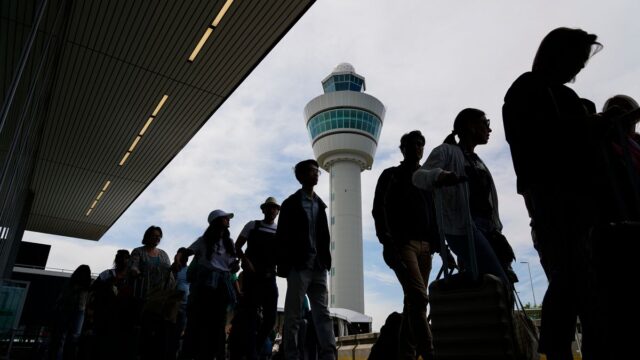New automated checks using biometric data are being introduced in the EU this autumn.
EU travel rules will force passengers from outside the bloc to go through a new automated system.
Known as Entry/Exit System or SES, will replace the stamping of passports for non-EU travelers who do not need a visa. These checks will use biometric data such as fingerprints, face scans and passport information, which will be taken the first time you enter an EU country after the introduction of the system.
After numerous setbacks, its introduction is scheduled for autumn of this year. But airlines have warned that the rollout is likely to have a big impact on travelers, including the end of last-minute bookings.
Why could the SES affect last minute reservations?
Currently, air passengers have to provide some information before flying, such as name, passport number and date of birth. This is known as Advance Passenger Information (API) and is likely to become more detailed when the SES is introduced.
It will also require airlines to get the green light for passengers to travel. The deadline for this is reportedly up to 48 hours before departure. They will have to submit the API for verification and the system will respond with an “OK” or a “NO OK” for the boarding. Airlines will also be fined if they allow passengers to board who do not comply with the regulations. This deadline and the complexity of the process is something that worries airlines for the people who last minute reservation.
The parent company of Ryanair, Buzz, Lauda Europe and Malta Air has expressed its Concern this could mean the end of last-minute ticket sales. In a document presented in December to the European Affairs Committee of the British House of Commons, the company stated that this “strict” deadline “is too long” and “would prevent last-minute ticket sales.”
The International Air Transport Association (IATA) has also said there could be delays for people who indicate in their API that they have a residence permit or long-stay visa for an EU country. This will have to be checked at the boarding gate and could lengthen the process.
Will the SES have other repercussions for air passengers?
Airlines have also warned of other problems for passengers, such as increased waiting times in the border controls and the lack of support in case of problems during introduction.
The Airlines for Europe (A4E) group says that “we remain deeply concerned that issues that will hinder the smooth introduction of SES this summer remain unresolved,” adding that “many of these issues were flagged months ago and progress in resolving them has been slow.”
In May, a group of professional associations, including A4E and IATA, sent a joint letter to Ylva Johansson, EU Commissioner for Home Affairs. It sets out airlines’ concerns about the introduction of the system.
Between them, lack of 24/7 assistance, to help airlines that have problems with the SES when it is launched. They say that without this support, it will “severely degrade the traveler experience.”
The letter lists delays in communication or lack of passenger information campaigns, inconsistent and delayed national testing, delays in applying pre-registration and lack of contingency plans in case countries are not sufficiently prepared. A study conducted in the United Kingdom in April, for example, revealed that two thirds of adults were unaware of the system.
There is also concern about the increase in processing time at the borders, since, according to sector forecasts, Border control will be extended by at least 30% to 50%. The EU has said it does not expect significant delays at airports and estimates that registering passengers’ biometric information for the first time will take between 90 seconds and two minutes per person.
Could the launch of the SES be delayed again?
Initially planned for May 2022, the launch of the SES has been delayed of repeatedly. Airlines have now warned that they have limited time to prepare for all this during the peak season, before the current launch planned for this autumn. There is still no official date for the registration of passengers, and the EU has said it will be confirmed later.
The annual report on the status of Schengen published by the European Commission in April notes that there are still challenges to overcome: “Although important progress has been made across the Schengen area, some Member States are still lagging behind, especially with regard to effective equipment of border crossings,” the report says.
It calls on Member States to urgently accelerate their preparations to ensure that the system can be implemented in time. The aviation sector organizations echo this opinion.
“The European Comission must accelerate its preparations if it is to have any hope of ensuring a seamless introduction of the SES,” says A4E. “This will require close coordination with Member Statesairlines and airports, as well as ensuring sufficient support to both these stakeholders and passengers.







